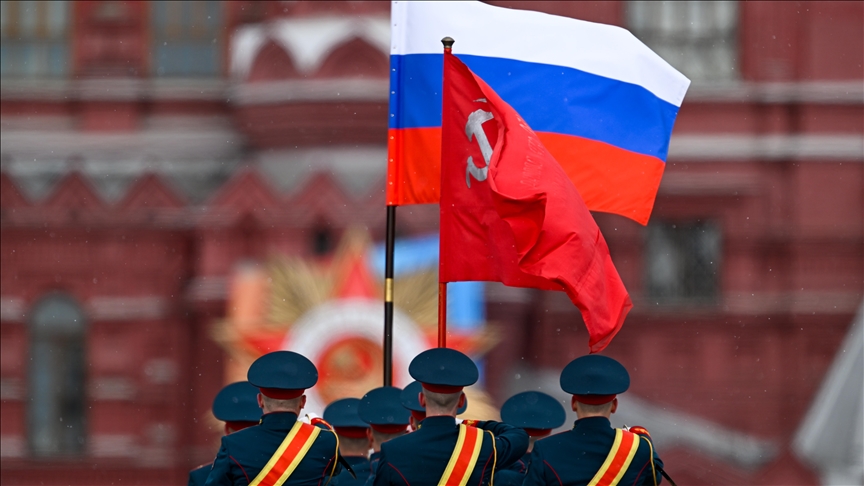FACTBOX - 80th anniversary of Russia's Victory Day: Issues surrounding this year’s celebrations
Latest edition of Victory Day parade in Moscow to take place amid 3-day unilateral ceasefire declared by Russian President Vladimir Putin

- Latest edition of Victory Day parade in Moscow to take place amid 3-day unilateral ceasefire declared by Russian President Vladimir Putin
- Presidents of Brazil, Palestine, Venezuela, China among leaders to attend May 9 celebrations- Ukrainian President Zelenskyy says he cannot guarantee safety of foreign leaders visiting Moscow for Victory Day events
ISTANBUL
Russia’s capital, Moscow, on Friday will host celebratory events, most notably a military parade, to mark the 80th anniversary of Victory Day.
Victory Day is a holiday celebrated in Russia and various former Soviet countries on May 9 in commemoration of the Soviet Union’s victory over Nazi Germany during World War II, a conflict Russia officially calls the Great Patriotic War.
As part of events surrounding the May 9 celebrations, a military parade is held at the Red Square located in Moscow annually, attended by foreign leaders.
The upcoming edition of the parade will be the third to take place since the start of the Russia-Ukraine war in 2022.
However, the events will also be taking place in the context of US-mediated talks on finding a settlement to end the armed conflict, which commenced soon after the inauguration of US President Donald Trump in January.
Issues dominating this year’s celebrations
While events surrounding Victory Day in Moscow are an annual recurrence, certain issues add to the context of this year’s edition of the celebrations.
The latest edition of Victory Day celebrations in Moscow comes particularly as Russian President Vladimir Putin declared a unilateral three-day ceasefire in Ukraine starting on May 8.
“Russia believes that the Ukrainian side should follow this example,” a Kremlin statement said on April 28, adding that Moscow will give “an adequate and effective response” if the ceasefire is violated by Ukraine.
In response, Ukrainian President Volodymyr Zelenskyy rejected the unilateral ceasefire proposed by Putin, going on to instead voice Kyiv's readiness to support a US-proposed 30-day ceasefire.
This ceasefire follows a US-brokered deal between Moscow and Kyiv to “ensure safe navigation” in the Black Sea and a 30-day halt on attacks targeting energy infrastructure.
However, despite the agreements, both sides accused each other of violating the pause during the period it was in effect.
Additionally, Zelenskyy expressed that he cannot guarantee the safety of foreign leaders that will be visiting Moscow for the Victory Day celebrations. “They (Russia) are responsible for your safety, and therefore we will not give you any guarantees,” he said.
The EU has also urged its members and candidate countries to not attend the celebrations in Moscow, with its foreign policy chief, Kaja Kallas, saying that participation “will not be taken lightly on the European side, considering that Russia is really waging a full-scale war in Europe.”
The Kremlin rejected Kallas’ call to boycott the Victory Day celebrations in Moscow as “not correct.”
Who will attend?
Despite a low turnout of Western officials, the upcoming Victory Day celebrations on May 9 will see the participation of numerous regional and international leaders.
In this regard, Putin himself defined his Chinese counterpart, Xi Jinping, as Moscow’s main guest at the May 9 celebrations during a meeting with Beijing’s top diplomat, Wang Yi, in Moscow early last month.
Russia and China both confirmed on Sunday that Xi will be arriving in Moscow for a four-day visit starting on May 7, during which he will also hold bilateral talks with Putin.
Aside from the Chinese president, leaders from some post-Soviet states, where Victory Day continues to be celebrated and is a national holiday, will also attend the parade on Friday.
Among those expected to attend the Victory Day parade in Red Square are the presidents of Azerbaijan, Belarus, Kazakhstan, Kyrgyzstan, Tajikistan, Turkmenistan, and Uzbekistan, as well as Armenia’s prime minister.
In terms of participation from European countries, only two leaders, namely Serbian President Aleksander Vucic and Slovak Prime Minister Robert Fico, have confirmed their participation in the parade in Moscow, amid criticism from the EU.
Bosnian Serb leader Milorad Dodik will also be present in Moscow for the parade.
The presidents of Brazil, Burkina Faso, Cuba, the Republic of Congo, Laos, Mongolia, Palestine, Venezuela, and Vietnam are also confirmed to attend the event.








